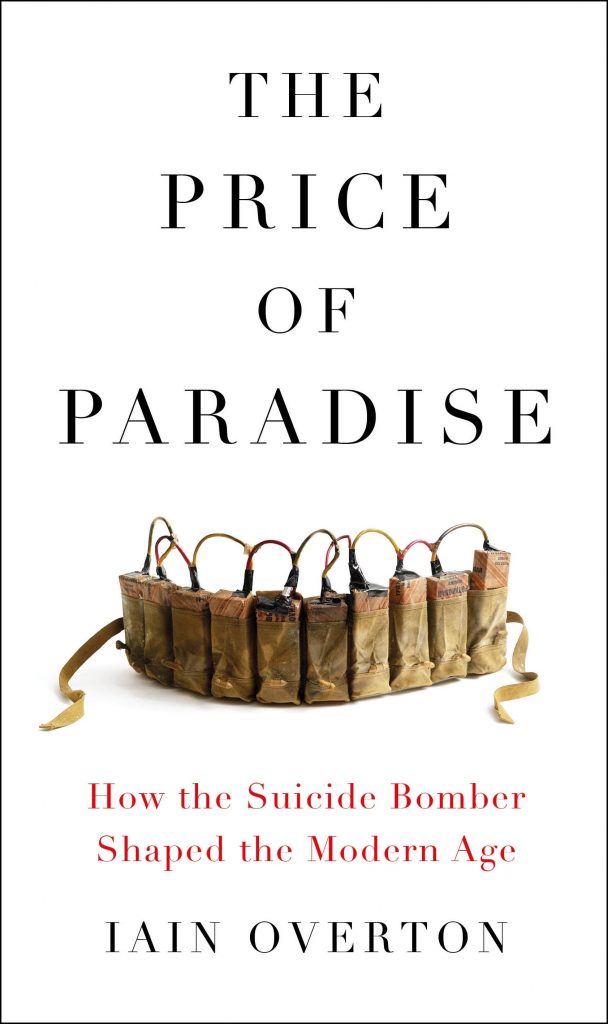

An excellent book, that is by turns fascinating and horribly depressing.
Starting with the assassination of a Russian Tsar, and moving forwards in time, via such phenomenon as the Kamikaze pilots of Japan in WWII, Iain Overton traces a history of suicide bombing.
One thing that may initially surprise readers – it certainly surprised me (though on reflection, less so) – is how recent a development the suicide bomber is. One could potentially quibble as to a slightly deeper origin (did any of the killers-self destruct during the ‘infernal device’ attempt on Napoleon’s life? Or were the casualties of that either unwitting proxies and/or unfortunate bystanders?).
Although it’s grim reading, Overton’s skill in laying out this macabre evolution is impressive. Indeed, at times his deft authorial touch was almost a bit too slick. And at those times it felt, to me, like there was a danger that the subject was becoming a form of extreme adventure tourism reportage.
One has to wonder, in an age and about a subject matter in which such reportage can attract the very worst kind of medieval responses from the enraged faithful, what makes anyone stick their head above the parapet at all. As Alan Partidge jokes when Sidekick Simon irreverently conflates Judaism with Islam, you can poke fun at Christians, by all means, and maybe Jews ‘a little bit’. But Islam is off limits! And for reasons made all too obvious in this book.
Of course Overton isn’t making fun of Islam. Nor, as he is at pains to point out, are suicide bombers only ever Arab Muslims. But even the mere attempt by an ‘outsider’ to discuss some of the subjects covered here might seem to many a red rag to a deranged homicidal bull. And yet he proceeds, over the course of 16 or so well constructed chapters to attempt to forensically study the rise of the suicide bomber.
That this mostly revolves around Islamic practitioners of this grisly but incredibly potent weapon will surprise no one. But the route there may. Taking in not just the aforementioned Russian anarchists and Japanese pilots, but also Sri Lankan Tamil Tigers. And Overton does a great job of mapping the grim and bloody road.
For most of the book the author successfully occludes his own judgements, in that time honoured modern western liberal mode of at least attempting to be balanced and dispassionate. Only occasionally letting slip through, or sometimes outrightly acknowledging, his own biases.
In examining why folk – be they men, women, or even children – might allow themselves to kill and be killed this way, or even embrace (sometimes individually, but more often in a collective context), such a ‘martyrdom’, and what the fallout is for the victims, their loved ones and the physically and mentally traumatised survivors, Overton eventually climbs down off the fence.
And so it is that quite near the end of this sizeable book, most clearly when talking about the victims, he talks bluntly of the ‘ugly ideology’ and ‘religious delusions’ of the perpetrators, and how wrong it is that those they murder be remembered solely via such an abrupt and violent end to their lives. Lives which had, until that cataclysmically fateful intersection, nothing to do with such toxic pre-medieval nonsense, enabled as it so frequently is, ironically, by so diabolically modern means.
It’s hard not to look at the events covered here, and how things have continued to develop since the book was published (2018) and despair. The self-appointed Davids of these persistent backwards folklores may not have slain the ‘Great Satan’ Goliaths, but they still seem to be winning, inasmuch as their impact is so incredibly pervasive. And that so few can adversely affect so many.
And with tragic irony all who aspire to a better world ultimately seem to lose. Only the thugs cloaked as religious fanatics, or the corporate suits – be they in Western or Arab garb – both disguising themselves, however thinly, cynically or otherwise, as ‘respectable’ types, literally profit.
Everyone else – and that’s beyond those killed and injured – suffers doubly. Firstly with the ever growing all-pervasive fears of death and destruction, and second with the zero-sum scenario, in which vast overspending on paranoic ‘defense’ measures, and the none too subtle erosion of hard won human rights, find the already far from perfect conditions of life in so-called liberal western societies (and elsewhere) being fundamentally eroded and undermined.
On the one hand I’m quite keen to read Overton’s previous book, Gun, Baby, Gun. But on the other I’m chary of doing so. Like the violence of the world generally, there’s a macabre fascination with the ‘dark side’. But one also needs to be wary of over-saturation, or even contamination, with all this ‘dark matter’.
Still, all in all, a very good and much needed book. He even offers, as one might hope and expect, some ideas about how we might move towards a better place. Hardly a light or easy read, but definitely recommended.
As a little footnote: in this interesting little article for the Grauniad, Overton illustrates how easily and suddenly, in our times/culture, one can awaken to discover you’ve been ensnared by the death merchants’ bloody ‘testicles of doom’: https://www.theguardian.com/global-development-professionals-network/2015/nov/22/i-woke-up-to-find-my-mortgage-owned-by-the-worlds-top-gun-investor (thanks to Count Arthur for the malapropism).

One Reply to “BOOK REViEW: The Price Of Paradise, Iain Overton, 2018”